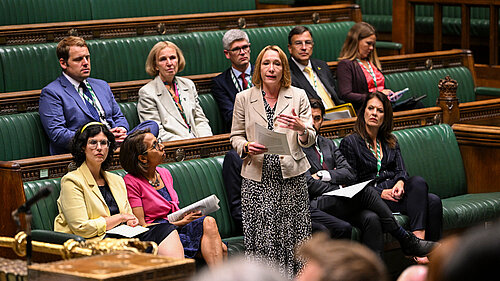3,000 children in Shropshire at risk of losing SEND support

Helen Morgan MP has called on the Government to ensure that the more than 3,000 children receiving additional SEND support in Shropshire are protected by the Government’s reforms to the system.
Analysis of the latest available data reveals that 3,016 pupils in Shropshire have an education, health and care plan (EHCP) which is for children and young people who need more support than is available at their school or college.
Of these, 1,377 EHCP students are in mainstream schools and are at particular risk of losing their rights to assessment and support under Labour’s rumoured plans.
The huge financial pressure on local authorities like Shropshire Council with limited resources means that families often encounter difficulties accessing the support their child needs. This is further compounded by the long distances many students have to travel to reach specialist provision.
Liberal Democrat MP Helen Morgan has supported dozens of constituents with difficulties accessing both the EHCP their child needs and the support designated in the plan.
Her party leader Ed Davey and Education Spokesperson Munira Wilson have written to Keir Starmer setting out five principles for SEND reform and offering to work on a cross-party basis with the government to ensure the reforms deliver for children with SEND and their families.
The five principles include maintaining the right to SEND assessments for children, boosting special school capacity, improving early identification and cutting waiting lists. The Liberal Democrats are also calling for more support for local authorities to provide SEND services and better training for school staff.
Helen Morgan, Liberal Democrat MP for North Shropshire, said, “Far too many children and families here in Shropshire and across the country have had to fight long battles to get the support they need.
“Local councils are under huge pressure and as a result many children aren’t getting the support they need.
“Change is needed, but I am very concerned that the Government’s approach will take support away from many families in our area. We cannot see children’s rights rolled back.
“It’s crucial we get this right. That’s why we have set out our five principles that should underpin future reform.”
NOTES
The Liberal Democrats’ five principles and priorities for SEND reform are as follows:
1. Putting children and families first
Children’s rights to SEND assessment and support must be maintained and the voices of children and young people with SEND and of their families and carers must be at the centre of the reform process.
2. Boosting specialist capacity and improving mainstream provision
Capacity in state special provision must be increased, alongside improvements to inclusive mainstream provision, with investment in both new school buildings and staff training.
3. Supporting local government
Local authorities must be supported better to fund SEND services, including through:
- The extension of the profit cap in children’s social care to private SEND provision, where many of the same private equity backed companies are active, and
- National government funding to support any child whose assessed needs exceed a specific cost.
4. Early identification and shorter waiting lists
Early identification and intervention must be improved, with waiting times for diagnosis, support and therapies cut.
5. Fair funding
The SEND funding system must properly incentivise schools both to accept SEND pupils and to train their staff in best practice for integrated teaching and pastoral care.